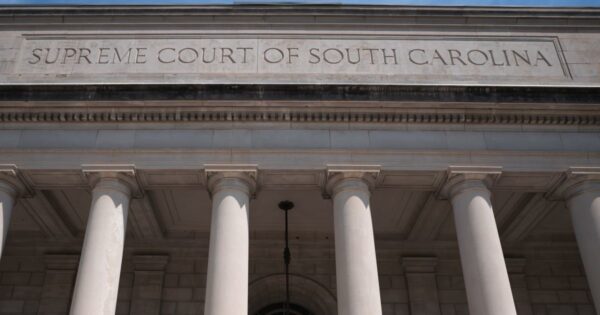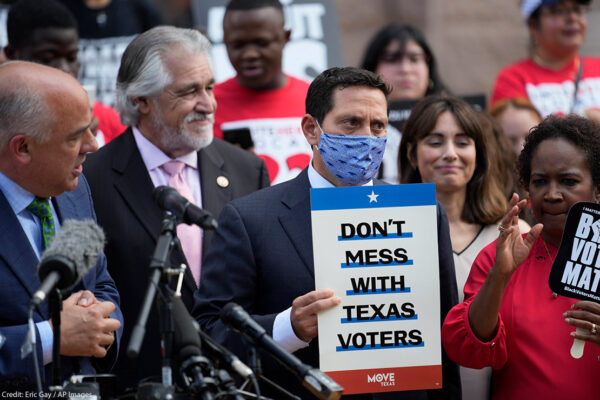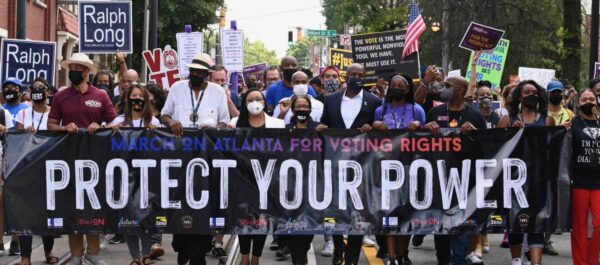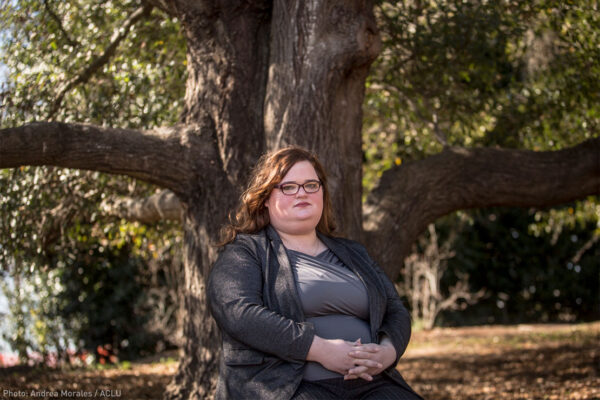Supreme Court Term 2024-2025
Weā€™re breaking down the cases we've asked the court to consider this term.
Latest Case Updates
Ongoing
Updated July 29, 2025
Closed (Judgment)
Updated July 25, 2025
Closed (Judgment)
Updated July 24, 2025
Closed (Judgment)
Updated July 21, 2025
Featured
Louisiana
Aug 2025

Voting Rights
Nairne v. Landry
Nairne v. Landry poses a challenge under Section 2 of the Voting Rights Act of 1965 to Louisianaā€™s House and Senate legislative maps on behalf of plaintiff Black voters and Black voters across the state.
Washington, D.C.
Aug 2025

Voting Rights
League of Women Voters Education Fund v. Trump
On March 25, 2025, in a sweeping and unprecedented Executive Order, President Trump attempted to usurp the power to regulate federal elections from Congress and the States. Among other things, the Executive Order directs the Election Assistance Commissionā€”an agency that Congress specifically established to be bipartisan and independentā€”to require voters to show a passport or other citizenship documentation in order to register to vote in federal elections. If implemented, the Executive Order would threaten the ability of millions of eligible Americans to register and vote and upend the administration of federal elections.
On behalf of leading voter registration organizations and advocacy organizations, the 51Ę·²č and co-counsel filed a lawsuit to block the Executive Order as an unconstitutional power grab.
U.S. Supreme Court
Aug 2025

Voting Rights
Callais v. Landry
Whether the congressional map Louisiana adopted to cure a Voting Rights Act violation in Robinson v. Ardoin is itself unlawful as a gerrymander.
Ohio
Jul 2025

Reproductive Freedom
Planned Parenthood Southwest Ohio Region et al., v. Ohio Department of Health, et al.
The 51Ę·²č, the 51Ę·²č of Ohio, Planned Parenthood Federation of America, the law firm WilmerHale, and Fanon Rucker of the Cochran Law Firm, on behalf of Planned Parenthood Southwest Ohio Region, Planned Parenthood of Greater Ohio, Preterm-Cleveland, Womenā€™s Med Group Professional Corporation, Dr. Sharon Liner, and Julia Quinn, MSN, BSN, amended a complaint in an existing lawsuit against a ban on telehealth medication abortion services to bring new claims under the Ohio Reproductive Freedom Amendment, including additional challenges to other laws in Ohio that restrict access to medication abortion in the state.
Georgia Supreme Court
Jun 2025

Voting Rights
Eternal Vigilance Action, Inc. v. Georgia
The 51Ę·²č and partner organizations intervened in this case to represent the rights of voters and voting-rights organizations in a case challenging a number of rules passed by the Georgia State Election Board. We challenged the rule requiring that the number of votes cast be hand counted at the polling place prior to the tabulation of votes. In a critical victory for Georgia voters, in June 2025, the Georgia Supreme Court upheld a lower courtā€™s decision permanently blocking the rule requiring hand counting of ballots at polling places before tabulation ā€” a process widely criticized for risking delays, ballot spoliation, and voter disenfranchisement.
U.S. Supreme Court
May 2025

Voting Rights
Racial Justice
Allen v. Milligan
Whether Alabamaā€™s congressional districts violate Section 2 of the Voting Rights Act because they discriminate against Black voters. We succeeded in winning a new map for 2024 elections which, for the first time, has two congressional district that provide Black voters a fair opportunity to elect candidates of their choosing despite multiple attempts by Alabama to stop us at the Supreme Court. Despite this win, Alabama is still defending its discriminatory map, and a trial was held in February 2025 to determine the map for the rest of the decade.
In May 2025, a federal court ruled that Alabama's 2023 congressional map both violates Section 2 of the Voting Rights Act and was enacted by the Alabama Legislature with racially discriminatory intent.
South Carolina Supreme Court
Jan 2025

Voting Rights
League of Women Voters of South Carolina v. Alexander
This case involves a state constitutional challenge to South Carolinaā€™s 2022 congressional redistricting plan, which legislators admit was drawn to entrench a 6-1 Republican majority in the stateā€™s federal delegation. Plaintiff the League of Women Voters of South Carolina has asked the stateā€™s Supreme Court to conclude that the congressional map is an unlawful partisan gerrymander that violates the state constitution.
Texas
Oct 2024

Voting Rights
OCA-Greater Houston v. Paxton
Texas has growing Hispanic and Black populations that helped propel record voter turnout in the November 2020 election. The Texas Legislature responded to this increased civic participation with an omnibus election bill titled Senate Bill 1ā€”SB 1 for shortā€”that targeted election practices that made voting more accessible to traditionally marginalized voters like voters of color, voters with disabilities, and voters with limited English proficiency. Since 2021, SB 1 has resulted in tens of thousands of lawful votes being rejected, and it remains a threat to democracy in Texas.
U.S. Supreme Court
Apr 2024

Reproductive Freedom
Idaho and Moyle, et al. v. United States
Idaho and Moyle, et al. v. United States was appealed to the U.S. Supreme Court by Idaho politicians seeking to disregard a federal statute ā€” the Emergency Medical Treatment and Labor Act (EMTALA) ā€” and put doctors in jail for providing pregnant patients necessary emergency medical care. The Supreme Court heard oral arguments on this case on April 24, 2024. The Courtā€™s ultimate decision will impact access to this essential care across the country.
All Cases
1,602 Court Cases

California
Jan 2025
Criminal Law Reform
Wilford v. Engleman (Amicus)
This case challenges the federal governmentā€™s authority to remove people from their homes, jobs, and loved ones and remand them to federal prison absent any alleged violation or process.
Explore case
California
Jan 2025

Criminal Law Reform
Wilford v. Engleman (Amicus)
This case challenges the federal governmentā€™s authority to remove people from their homes, jobs, and loved ones and remand them to federal prison absent any alleged violation or process.

Alabama
Jan 2025
Voting Rights
Alabama State Conference of the NAACP v. Allen
Alabama State Conference of the NAACP v. Allen challenges Alabamaā€™s most recently drawn state legislative maps as dilutive of Black voting power in the state in violation of Section 2 of the Voting Rights Act of 1965. The case is scheduled for trial in fall 2024.
Explore case
Alabama
Jan 2025

Voting Rights
Alabama State Conference of the NAACP v. Allen
Alabama State Conference of the NAACP v. Allen challenges Alabamaā€™s most recently drawn state legislative maps as dilutive of Black voting power in the state in violation of Section 2 of the Voting Rights Act of 1965. The case is scheduled for trial in fall 2024.

Georgia
Dec 2024
Voting Rights
Sixth District of the African Methodist Episcopal Church v. Kemp
Civil rights groups filed a federal lawsuit on March 29, 2021, against Georgiaā€™s sweeping law that makes it much harder for all Georgians to vote, particularly voters of color and voters with disabilities. This law spans all aspects of Georgiaā€™s voting process, including imposing a criminal ban on providing food and water to voters waiting in line, limiting dropbox access and ballot return assistance, rejecting absentee ballots for forgetting to add a birthdate to an envelope or for failing to provide more restrictive identifying information or photo ID copies along with absentee ballots. Premised on low voter confidence and born out of the Big Lie about the 2020 election, this law targets methods of voting disproportionately used more and more by Black voters and others voters of color just as they began to exercise greater political power.
Explore case
Georgia
Dec 2024

Voting Rights
Sixth District of the African Methodist Episcopal Church v. Kemp
Civil rights groups filed a federal lawsuit on March 29, 2021, against Georgiaā€™s sweeping law that makes it much harder for all Georgians to vote, particularly voters of color and voters with disabilities. This law spans all aspects of Georgiaā€™s voting process, including imposing a criminal ban on providing food and water to voters waiting in line, limiting dropbox access and ballot return assistance, rejecting absentee ballots for forgetting to add a birthdate to an envelope or for failing to provide more restrictive identifying information or photo ID copies along with absentee ballots. Premised on low voter confidence and born out of the Big Lie about the 2020 election, this law targets methods of voting disproportionately used more and more by Black voters and others voters of color just as they began to exercise greater political power.

Alabama
Dec 2024
LGBTQ Rights
Corbitt v. Taylor
The 51Ę·²č and 51Ę·²č of Alabama filed a federal law suit against officials of the Alabama Law Enforcement Agency (ALEA) for depriving transgender people of driver licenses that reflect their gender. The lawsuit states that the Alabama government has violated the privacy, due process, free speech, and equal protection rights of Darcy Corbitt, Destiny Clark, and a third, unnamed plaintiff.
Explore case
Alabama
Dec 2024

LGBTQ Rights
Corbitt v. Taylor
The 51Ę·²č and 51Ę·²č of Alabama filed a federal law suit against officials of the Alabama Law Enforcement Agency (ALEA) for depriving transgender people of driver licenses that reflect their gender. The lawsuit states that the Alabama government has violated the privacy, due process, free speech, and equal protection rights of Darcy Corbitt, Destiny Clark, and a third, unnamed plaintiff.

Maryland Supreme Court
Dec 2024
Criminal Law Reform
Roland Branch v. State of Maryland
This petition to the Supreme Court of Maryland asked the court to reconsider its adherence to Whren v. U.S., 517 U.S. 806 (1996), which declared that a traffic stop undertaken for pretextual reasons does not violate the Fourth Amendment to the U.S. Constitution so long as the police have probable cause to believe that a traffic violation occurred. The 51Ę·²č, alongside the 51Ę·²č of Maryland, filed an amicus brief in support of the defendantā€™s petition, in which the 51Ę·²č argued that the court should take up the question of whether pretextual stops violate the Maryland Constitution. In September 2024, the Court denied the petition.
Explore case
Maryland Supreme Court
Dec 2024

Criminal Law Reform
Roland Branch v. State of Maryland
This petition to the Supreme Court of Maryland asked the court to reconsider its adherence to Whren v. U.S., 517 U.S. 806 (1996), which declared that a traffic stop undertaken for pretextual reasons does not violate the Fourth Amendment to the U.S. Constitution so long as the police have probable cause to believe that a traffic violation occurred. The 51Ę·²č, alongside the 51Ę·²č of Maryland, filed an amicus brief in support of the defendantā€™s petition, in which the 51Ę·²č argued that the court should take up the question of whether pretextual stops violate the Maryland Constitution. In September 2024, the Court denied the petition.
